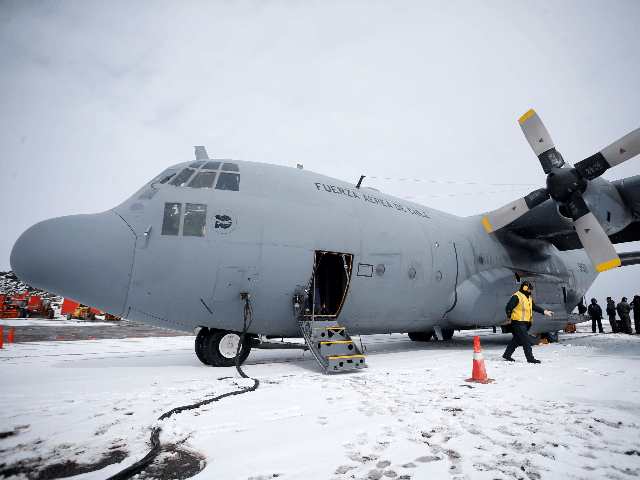President Sebastián Piñera of Chile confirmed reports early Tuesday of the disappearance of a Hercules C-130 military aircraft en route to Antarctica, describing the incident as an “accident.”
The Chilean military, with aid from neighboring Uruguay, Argentina, and the United States, has begun a search of what officials consider the likely crash site of the plane. There is not at press time any evidence that the plane crashed, but its sudden disappearance off of military radar and complete lack of communication with the air traffic regulators monitoring it suggests the plane fell somewhere along its path to Chile’s Antarctic scientific research site.
Presidente Piñera y ministros de Interior y Defensa monitorean acciones de búsqueda de aeronave FACH desaparecida mientras volaba rumbo a la Antártica https://t.co/Az9iMP5gZw pic.twitter.com/qUkRmlUxDd
— Prensa Antártica (@prensaantartica) December 10, 2019
Authorities in Santiago confirmed 38 people, about half members of the crew and half soldiers, were onboard the flight, which departed Punto Arenas, Chile, at 2 p.m. local time on Monday. Three passengers were identified as civilians. It was expected to land at Chile’s Eduardo Frei military base in Antarctica at about 7:30 p.m. local time, the armed forces confirmed in a press release, but disappeared about an hour before. By midnight on Tuesday, military officials declared that the airplane had likely crashed and launched a search and rescue operation in the Drake Passage, the waters in between the southernmost continent and South America.
The Argentina outlet Infobae described the aircraft’s mission as one of “supply and logistics support,” ensuring that the military base was both fueled and properly furbished in light of the difficult conditions on the continent.
President Piñera announced via Twitter that he would cancel his scheduled visit to Argentina Tuesday – to attend the inauguration of leftist President-elect Alberto Fernandez – and that Fernandez had pledged to help in search and rescue operations.
“My thoughts and prayers are with the family of the 38 passengers and crew of the C-130 airplane of the [armed forces],” Piñera wrote, adding that Fernandez also said he would soon visit Chile:
Mis pensamientos y oraciones están con los familiares de los 38 tripulantes y pasajeros del avion C-130 de la Fach.Acabo de hablar con Pdte electo de Argentina Alb Fernández para informarle q no podré asistir a cambio de mando hoy. Confirmó que pronto hará visita oficial a Chile.
— Sebastian Piñera (@sebastianpinera) December 10, 2019
Also offering support, Piñera later added, was conservative Brazilian President Jair Bolsonaro, who confirmed at least one Brazilian military official with experience in Antarctic operations had already been assigned to the mission.
“I have just spoken to President [Jair Bolsonaro] who has offered all of Brazil’s help in the tasks to search for the [armed forces] aircraft,” Piñera said. “With the help of many, we are making every effort humanly possible to find the plane.”
In televised remarks, Piñera reportedly referred to the disappearance as an “accident.” Neither the president nor any senior officials have indicated that any evidence exists that the aircraft was attacked or suffered any foul play. The lack of indication of any partisan or terrorist attack did not stop rumors from spreading online, however. The official Twitter account of the armed forces of Chile debunked an alleged press statement circulating in leftist social media circles indicating that the military would use the missing aircraft to crack down on radical leftists, which have been rioting and burning down a significant amount of the capital for the past month.
“We inform you that this press release is FALSE and we lament that in these moments some are misusing information that can affect our colleagues and their loved ones,” the armed forces said.
The false statement claimed that the U.S. military gave direct orders to shoot the plane down and that the Chilean military had staged a coup against Piñera because of his friendly ties to Washington.
Se informa que este comunicado es FALSO y lamentamos que en estos momentos se esté mal utilizando información que puede afectar a los familiares y nuestros camaradas #FACh involucrados. @Ejercito_Chile @mindefchile pic.twitter.com/h9bee8C8WL
— Fuerza Aérea de Chile (@FACh_Chile) December 10, 2019
The aircraft’s disappearance, and subsequent internet conspiracy theories surrounding the event, follow months of violent riots by leftists in the country, often described as the most economically successful and socially stable in the region. Protests began in October against a proposed subway fare hike in Santiago. Piñera heeded the protests and the local government tabled the proposal to raise the fares, but riots ensued anyway, targeting dozens of conservative political party headquarters, churches, subway stations, supermarkets, and other public areas. Piñera then offered more concessions – including plans to draft an entirely new constitution – but this has so far not managed to quell the violence.
Like leftist riots in neighboring Ecuador, Bolivia, and Colombia, Chile’s riots appear to be at least in part fueled by foreign agents from Cuba and Venezuela. Chilean immigration officials deported dozens of foreigners last month, including at least 30 Cuban nationals, found hoarding weapons and organizing mass actions of violence. Chilean public officials have told Breitbart News there is mounting evidence of organized terrorist activity fueled by agents from Cuba’s communist regime, which controls the Venezuelan socialist enterprise – including evidence of these agents offering drugs and alcohol to rioters to embolden them to destroy more property. Local media reports have highlighted the frustration of Chileans not engaging in the riots who, thanks to the destruction of their local grocery stores or subway stations, have had their access to food and basic goods limited in an otherwise wealthy nation.

COMMENTS
Please let us know if you're having issues with commenting.